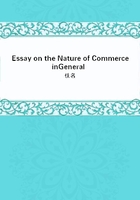
第33章
I will first observe that all country produce is furnished by labour which may possibly, as already often suggested, be carried on with little or no actual money. But all merchandise is made in cities or market towns by the labour of men who must be paid in actual money. If a house has cost 100,000 ounces of silver to build, all this sum or the greatest part of it, must have been paid every week in small amounts to the brickmaker, masons, carpenters, etc. directly or indirectly. The expense of the humble families, who are always the most in number in a city, is necessarily made with actual money. In these small exchanges credit, book debts, and bills cannot have a place. The merchants or retailers demand cash for the things they supply: or if they give credit to a family for a few days or months they require a substantial money payment. A carriage builder who sells a carriage for 400 ounces of silver in notes, will have to change them into actual money to pay for all the materials and the men who have worked on his carriage if they have worked on credit, or, if he has paid them already, to start a new one. The sale of the carriage will leave his profit and he will spend this to maintain his family. He could not be satisfied with notes unless he can put something aside or lay it out at interest.
The consumption of the inhabitants of a state is, in a sense, entirely for food. Lodging, clothing, furniture, etc.
correspond to the food of the men who have worked upon them; and in the cities all drink and food are of necessity paid for in hard cash. In the families of landowners in the city food is paid for every day or every week: wine in their families is paid for every week or every month; hats, stockings, shoes, etc. are ordinarily paid for in actual money, at least the payments correspond to cash for the men who have worked upon them. All the sums which serve to pay large amounts are divided, distributed, and spread in small payments corresponding to the maintenance of the workmen, manservants, etc. and all these sums are necessarily collected and reunited by the undertakers and retailers who are employed on the subsistence of the inhabitants to make large payments when they buy the products of the farmers. An alehouse keeper collects by sols and livres the sums he pays to the brewer, who uses them to pay for all the grain and materials he buys from the country. One cannot imagine anything is bought for ready money in a state, like furniture, merchandise, etc. the value of which does not correspond to the maintenance of those who have worked upon it.
Circulation in the cities is carried out by undertakers and always corresponds directly or indirectly to the subsistence of the menservants, workmen, etc. It is not conceivable that it can be effected in small detail without cash. Notes may serve as counters in large payments for a certain time; but when the large sums come to be distributed and spread into small transactions, as is always the case sooner or later in the course of circulation in a city, notes cannot serve the purpose and cash is needed.
All this being presupposed, all the classes in a state who practice some economy, save and keep out of circulation small amounts of cash till they have enough to invest at interest or profit. Many miserly and timid people bury and hoard cash for considerable periods.
Many landowners, undertakers and others, always keep some cash in their pockets or safes against unforeseen emergencies and not to be run out of money. If a gentleman makes it his remark that he never had less than 20 louis in his pocket throughout the whole year, it may be said that this pocket has kept 20 louis out of circulation for a year. One does not like to spend up to the last sou, one is glad not be completely denuded, and to receive a new instalment before paying even a debt with the money one has.
The capital of minors and of suitors is often deposited in cash and kept out of circulation.
Beside the large payments which pass through the hands of the farmers in the quarterly terms of the year there are many others from one undertaker to another in the same terms, and others at different times from borrowers to lenders of money. All these sums are collected in retail trade, are spread abroad anew and come back sooner or later to the farmer: but they seem to require a more considerable amount of cash for circulation than if these large payments were made in different times from those when the farmers are paid for their produce.
In fine there is so great a variety in the different orders of the inhabitants of the state and in the corresponding circulation of actual money, that it seems impossible to lay down anything precise or exact as to the proportion of money sufficient for the circulation. I have adduced so many examples and inductions only to make it clear that I am not far out of the truth in my conclusion "that the actual money necessary for the circulation of the state corresponds nearly to the value of the third of all the annual rents of the landlords." When the landlords have a rent which amounts to half the produce or more than a third, a greater quantity of actual money is needed for circulation, other things being equal. When there is great confidence in the banks and in book credits less money will suffice, as also when the rapidity of circulation is accelerated in any other way. But I shall show later that public banks do not afford so many advantages as is usually supposed.